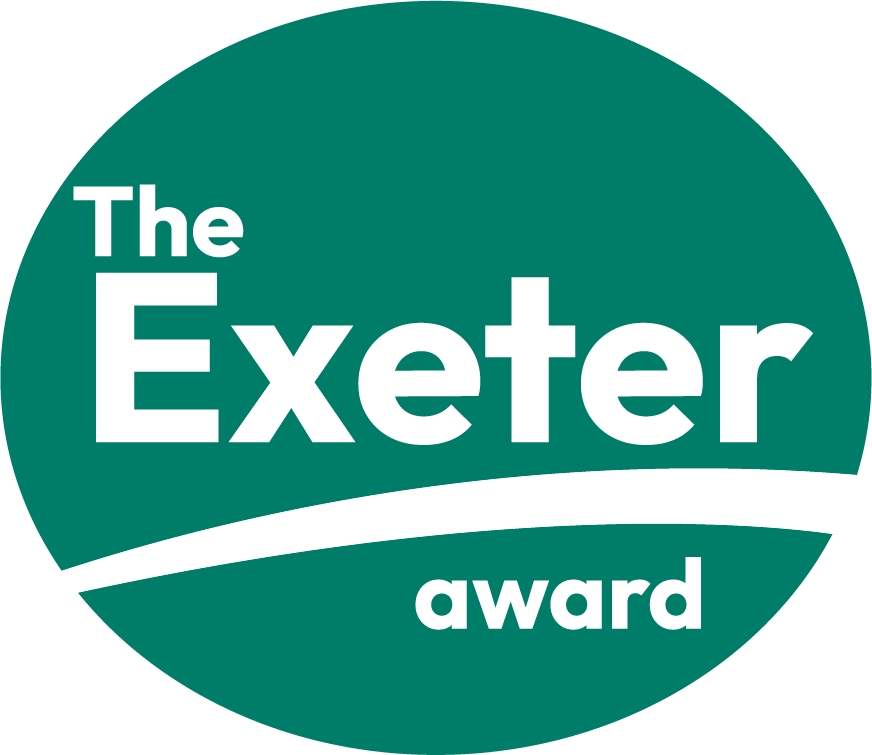
You can count the hours on your project towards the Exeter Award, where you can also access training in relevant personal and professional skills.

If you have already completed the Exeter Award, you can develop your skills further and more specifically within Leadership and Management through the Exeter Leaders Award, using your Change Agents project experience as your case study.
Funding Guidance
Funding Proposal Guidance
Purpose of Funding and Eligibility
Funding is primarily intended to pay the reimbursement of student hours worked on each project, but can be used to pay for some minor project costs, e.g. room booking costs, etc. Proposals should therefore structure their requested budget based on the number of hours they expect they need to complete a specific activity.
Students will be set up and paid as temporary workers of the University, with payments made on the current Tier 2 grade of £14.12 per hour. It is crucial that any student named on your project proposal must have a right to work in the UK; we will not be able to pay students who do not meet this criteria.
Each named student lead will also be expected to complete around 4 hours of introductory training, so the cost of this time must also be factored in to your proposal.
Panel Review and Start Dates
After the application deadline on Monday 24th March, project proposals will be judged by a panel of staff and student representatives. We intend to release the outcome of the panel's decision within a week following the deadline. While we will aim to give a clear accept or reject decision to all projects, some proposals may be asked to revise and update their proposal before we release funding.
Further funding will not be available once a project has been approved or has started work, and we anticipate receiving more proposals than the funding amount will allow us to support. It is therefore critical that your project application asks for the right amount of funding, and that you ensure your application has all the information to make it as strong as possible.
Further Support and Examples
You can use the attached Project Scoping Guide to pull out the detailed information needed for creating a strong bid. You can also download the Funding Application Questions here as an editable Word document to help you prepare your answers before submitting these through the registration form at the top of this page.
If you would like help writing your bid, you can attend more or more of our online drop-in workshops to discuss any aspect of your project proposal. Alternatively, you can email us to request a 1-1 session with your project team:
The pull-down menu below contains three examples of cost structures which may help you to start your bid and in requesting the right amount of funding.
Example budget required of £700
This would pay for around 50 hours at £14.12, which across 10-15 weeks of project delivery equates roughly to 3-5 paid hours per week.
A small project would have a very focused objective, only needing one student lead and most likely working in partnership with one staff member. Examples of a small project may include:
- a short research/feedback project investigating a very specific area of the student experience.
- delivery of a simple event or activity such as a small conference or talk.
- a project to create a simple set of resources, such as a handbook, a website, or other interactive media.
Example budget required of £1,100
This would pay for around 80 hours at £14.12, which across 15-20 weeks of project delivery equates roughly to:
- 4-6 hours per week for 1 student lead
- 2-3 hours per week each for 2 student leads
A medium project would have a solid objective that the business case can clearly prove is necessary, and would need 1-2 student leads likely working in partnership with at least one staff member. Examples of a medium project may include:
- a research and feedback project investigating an area of the student experience for a broad student cohort.
- a project to deliver multiple events or activities, such as a conference, a workshop/lecture series.
- establishing a complex support activity such as a year-round peer support programme or Term 1 transition support for new students.
While a medium project may be able to be delivered with just one student lead, we would recommend making use of two leads to ease the workload over such a tight delivery window, and to maximise the benefit of collaborative working.
Example budget required of £1,500
This would pay for around 110 hours at £14.12, which across 15-20 weeks of project delivery equates roughly to:
- 3-4 hours per week each for 2 student leads
- 2-3 hours per week each for 3 student leads
A large project would have a focused objective but with a broad impact, and would need 2-3 student leads and working in partnership with as many staff members. A large project would need to put forward a very clear business case for their proposal and would have to demonstrate clear impact at the end of the project delivery window. Examples of large projects would need to impact a significant and diverse group of students and could include:
- creating and delivering a complex series of events, activities, and resources such as conferences, workshop/lecture series, and resources which can be easily maintained and used after the project is complete.
We would recommend that a large project aiming to deliver such a broad impact over a short window is not suitable to be delivered with just one student lead.

